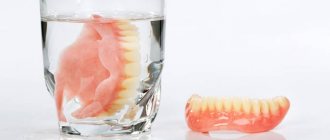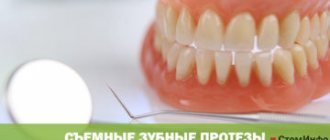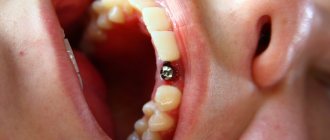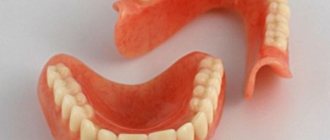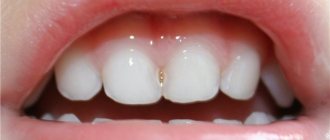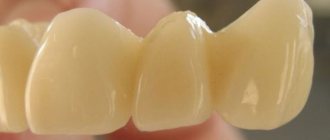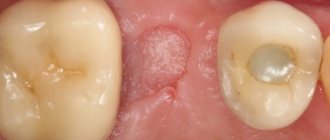1951
Ten years ago, with complete edentia, the only solution to eliminate the problem was the installation of implants, which served as a fastener for a special plate.
This technique caused discomfort in patients, for which, in fact, it does not deserve attention these days.
Today, dentistry has become a rapidly developing medical science, which is persistently moving towards new discoveries.
Innovative solutions have emerged that make it possible to painlessly and comfortably attach removable copies of teeth using suction cups (vacuum effect).
The method was distinguished by its low-injury nature both physically and morally.
Design and fixation features
Some patients take the term “suction cup denture” literally. This is wrong. The design does not have concave fixation elements, but is attached using a vacuum effect obtained due to the interface of the mucous membrane and the prosthesis itself.
In the production of such products, elastic materials based on polymers are used. In order for the prosthesis to have maximum suction properties, it is made according to impressions of the patient’s jaws.
As a result, the surface of the system exactly repeats the relief of the periodontal mucosa down to the smallest personal features of its structure.
During the manufacturing process, the end parts of the structure . In areas where the jaw bone structure comes into contact with soft tissues (cheeks, lips), the sides should “mask” the transition area by at least 1 mm.
The created ring valve promotes high-quality fixation of the structure, attracting it to the gum along the total length of its border. In addition, it prevents air flows from entering under the system.
Thanks to the unique design features of the system, artificial plug-in analogues of natural units are distinguished by special advantages responsible for reliable fastening:
- Increased adhesiveness . This means that the surface of the system exactly corresponds to the relief of the gum tissue and the horizontal plate of the palatine bone, as well as the flat mass of salivary gland secretion accumulated in the intermediate space.
- Functional suction . It is formed as a result of a vacuum space that has arisen in the oral cavity between the inserted copy and the soft structures.
In dental practice, suction cup systems are used for complete and partial edentia. The attachment on the upper jaw is, as a rule, more reliable compared to the movable one. This is explained by its comparative unshakability and the presence of a wide palatal platform.
For removable prosthetics of the lower jaw, specialists often resort to adhesives, since constant movements of the tongue and the bone structure itself prevent reliable fixation.
Let's find out together which removable dentures are better, based on the opinions of experts and patients.
Read here fair reviews about nylon dentures.
At this address https://zubovv.ru/protezirovanie/semnyie-p/byugelnyie/na-verhnyuyu-chelyust-podrobnoe-opisanie.html you will learn how the clasp prosthesis for the upper jaw works.
Types of structures
Depending on the material used, there are several types of prostheses:
- acrylic;
- nylon;
- polyurethane;
- polypropylene.
Depending on the indication for installation, there are differences between complete and partial dentures with suction cups, which can replace a full row of teeth.
Plastic dentures with suction cups
Acrylic is one of the types of plastic that is approved for use in dentistry. It does not affect the composition of saliva and does not change the taste of food. But upon contact with hot foods, it can release toxic substances, provoking the development of allergies due to the methyl content.
Among the disadvantages of an acrylic prosthesis is rapid deformation even with proper care. The material breaks easily and becomes cracked. But the low price makes it affordable for most people with limited incomes. More sophisticated models are equipped with silicone inserts that absorb pressure during chewing and improve adhesion to the gums.
Silicone dentures are considered to be of higher quality and are an excellent and inexpensive alternative to acrylic. But they are additionally fixed with metal clasps, which is not suitable for all patients. The porous structure of the material quickly accumulates microparticles of food, so an unpleasant odor and softening of the base may occur.
The most durable type of nylon prosthesis is polyurethane products with suction cups. The material is considered hypoallergenic and safe for human health and does not affect the taste of food. The soft base does not put pressure on the palate and tongue and has good flexibility. Technicians manage to cast the thinnest possible rollers, which are not felt when worn for a long time during the day.
Read Dentures with and without hooks, clasps for dentures - what are they?
False teeth with suction cups without palate
A common type of dental structure for complete tooth loss is suction cup dentures without a palate. This is a beautiful and lightweight set of teeth fixed on artificial gum made of elastic material. They are called telescopic and are designed based on a simple “butterfly”. It can be installed on crowns or implants.
Features of a prosthesis without a palate:
- pressure on the gums is reduced;
- do not provoke changes in the purity of pronunciation of sounds;
- easy to get used to in 1–3 days;
- do not cause a gag reflex.
When made from nylon, a prosthesis without a palate retains its properties and appearance for at least 8–10 years. But a serious drawback is the need to grind down the patient’s own teeth before installing a crown.
Types of materials
When choosing a base (material) for a future dental copy on suction cups, it is important to take into account the advice of a specialist, the individual characteristics of the patient, and evaluate the disadvantages and advantages of all options.
Patients have the opportunity to choose one of three raw material solutions that serve as the basis for insertion removable systems. Let's look at them in detail.
Acrylic
Dentists often use acrylic dentures in their practice, as they consider it an affordable way to restore the chewing and aesthetic functions of the dentition for all categories of patients.
The device, made of acrylic plastic, is durable, and in the absence of any specimens, only gum tissue is used as a support.
It has virtually no contraindications, therefore it is widely used in prosthetics. When installing such systems, age category and the presence of a number of diseases do not matter.
The aesthetic indicators of acrylic reach the highest level. Only a specialist can visually distinguish a prosthesis from natural units.
The inner side of the product is equipped with a silicone insert, which helps to evenly distribute the load during chewing.
The main advantages of such products:
- durability;
- ease of care;
- production in a short time;
- democratic price.
Despite having a large number of advantages, such inserted copies have a number of negative qualities:
- contain toxic ether compounds that provoke allergic reactions;
- due to exposure to damaging mechanical factors, the prosthesis may be damaged;
- the porosity of the material becomes a suitable environment for the proliferation of pathogenic microorganisms and bacteria, which provokes the occurrence of a foul odor from the oral cavity.
Nylon
The nylon system is a plate product that differs from the acrylic copy in a softer base. In dentistry, it is often called a silicone structure.
There is no large list of contraindications for such prostheses, and the cost of the material itself is affordable compared to other types of prostheses.
The advantages are as follows:
- Flexibility . Important feature. The combination of such qualities as strength and flexibility allows the product not to change its original shape and be precisely adjusted to the parameters of the jaw.
- No allergic reactions . This feature plays an important role for those patients who experience allergic reactions to products made of metal or other materials. The biocompatibility of nylon with oral tissues is almost perfect.
- Aesthetics . Dentures have maximum similarity to the appearance of natural teeth and gums, and are not susceptible to the effects of pigmented substances during wear.
- Possibility of installation on weak gums.
- Long service life.
The disadvantages include:
- using a special product to clean the product;
- inability to use a toothbrush for hygiene procedures;
- a damaged system requires complete replacement.
Polyurethane
In terms of strength and flexibility, structures made of dentalur (flexible plastic) are superior to nylon products.
This material is resistant to high loads and temperature instability, does not cause allergic reactions, and rejects moisture, which eliminates the possibility of bacterial growth.
The installation of polyurethane dentures has a minimum of contraindications, but it is not used to reconstruct dentition in completely edentulous patients.
Advantages:
- long service life;
- high levels of biocompatibility;
- relatively low cost;
- wear resistance;
- excellent aesthetic appearance;
- the ability to maintain integrity during bending and spontaneously restore its original shape;
- excellent resistance to the destructive effects of external factors;
- absence of metal fastening elements;
- comfort and ease of wearing.
Disadvantages of the system:
- long period of adaptation;
- the prosthesis is relatively rigid;
- impossibility of using the product in the complete absence of bone organs of the oral cavity.
Application:
- the simplest application is in the kitchen or bathroom for hanging various utensils or towels:
Thanks to their neutral composition, the suction cups do not rust or rot from moisture.
In addition, they are transparent and practically do not stand out against the general background - as grips. Since the suction cup has a fairly strong ear, you can attach any loop or other suction cup to it:
In this way, suction cups can be used to replace touchscreens on tablets or smartphones
- as stops. When renovating an apartment, I used these suction cups to secure primitive curtains, since the curtains with curtains had been removed
In total, for 75 cents we get a very convenient gadget, which in some cases will save both time and money. I definitely recommend buying...
Indications and contraindications
This prosthetic option is recommended in the following cases:
- fragmentary removal of dental units;
- complete loss of teeth resulting from dental disease or abnormal development of the dental system;
- impossibility of using other methods for restoring lost copies.
Suction cups are prohibited from being installed in two cases:
- damage to the mucous membrane of the gums;
- inflammatory diseases occur.
Manufacturing and installation
The technological process of installing dental structures on suction cups is divided into several mandatory procedures:
- The doctor's consultation .
The specialist reviews the clinical situation and prescribes diagnostic tests to identify possible contraindications. Together with the patient, the choice of material for the manufacture of the future product is made. If dental problems are identified that can be eliminated, the doctor provides appropriate treatment. - Making an impression. An accurate imprint is made using the classical method using special impression material. The copy will later serve as a template in the dental laboratory to create a permanent model.
- Model fitting . This manipulation is mandatory to eliminate defects that interfere with comfortable wearing. If any deficiencies are identified, the copy will be corrected.
- Control fitting session . The doctor evaluates the system for its ideal condition, advises the patient on the nuances of correct installation and removal of the product, and gives recommendations for care.
- Installation of the structure . This process is carried out by the patient at home. To make the attachment more durable, you can use special formulations in the form of a paste or gel, available in a wide range at pharmacies.
In what cases is the use of a removable overdenture denture justified and how is the structure installed?
In this article, we’ll talk frankly about repairing dentures - is it worth doing it, and can it be done on your own?
Here https://zubovv.ru/protezirovanie/semnyie-p/byugelnyie/atsetalovyiy.html you will find rules for caring for acetal dentures.
Advantages and disadvantages
Advantages and disadvantages
Experts include the following advantages of suction cup structures:
- low cost;
- similarity in appearance to natural tooth enamel, repeating the shape of the palate and the color of the mucous membrane;
- convenient use, no discomfort due to friction during operation;
- long service life;
- complete restoration of chewing functions;
- minimizing the risk of injury to the tongue, cheeks or gums;
- painless installation.
Despite the many advantages, there are also disadvantages of the design:
- not all dentures adhere firmly to the jaw;
- requires careful care and storage in a special solution;
- some materials cause allergies;
- an incorrectly selected design makes it difficult to get used to, leading to rejection and vomiting;
- for better attachment it is necessary to use a special cream;
- At first, there is a change in diction and a sensation of a foreign body in the mouth.
Some disadvantages can be overcome in the process of getting used to the prosthesis. The rapid restoration of the dentition makes these structures in demand among many clients.
Primary requirements
For long-term and comfortable use of the prosthesis, it is important to check its compliance with a number of requirements.
They are as follows:
- absence of elements that cause allergic reactions;
- extreme correspondence of the contours of the inserted copy to the anatomical surface of the jaw structure;
- preserving the potential of taste receptors, which may partially reduce their functionality if the product is not manufactured correctly.
- the system body should not put pressure on the gum tissue, causing them to sag. If such violations occur, the model must be replaced.
Life time
The question of the service life of a device is purely individual. It all depends on the characteristics of a particular prosthesis and the material used in its creation.
Typically, each specific product has its own warranty period. During this period and subject to strict adherence to the rules of hygiene and care, the device can be replaced with a new design if it becomes deformed or damaged.
The service life of suction cup dentures can be significantly extended by following a few simple recommendations:
- Every morning and evening, clean the surface of the device using a device with soft bristles;
- once a week, treat the product with special antiseptics to disinfect the surface;
- minimize the possibility of mechanical force, increased loads during meals, injuries to the jaw system caused by aggressive environmental influences;
- Visit the dentist twice a year to evaluate the condition of the oral cavity and the health of natural units.
Features of upper and lower dentures with suction cups
Dentures for the upper jaw are fixed better - due to the presence of additional support in the form of a wide palate. Below there is a frenulum and mobile mucosa, which can prevent the structure from holding tightly. Due to anatomical features, a secure fastening may become loose during conversation or eating.
To prevent discomfort, dentists recommend using special fixing compounds that improve the fit of the prosthesis to the soft tissues of the gums. Such drugs can be found in pharmacies, after consulting with your doctor.
Rules of care
Removable dentures require regular wear and daily removal for quality cleaning.
Consistency of use will depend on the patient’s individual sensations that determine comfort during use.
Experts give several competent recommendations for care:
- in order to protect the product from contamination, the growth of bacteria on its surface and the settling of dust particles during the period of rest from wear, it is necessary to purchase a special container;
- daily care of the product is identical to the cleaning of natural units and is carried out using pastes that have a zero abrasive index;
- periodically the structure must be immersed overnight in an antiseptic solution;
- Once every 6 months, the device is shown to a specialist to check its condition and functionality; if the need arises, he adjusts the product perfectly, eliminates defects or carries out minor repairs.
Caring for dentures with suction cups
With proper care, a removable jaw can last up to 20 years. Patients should be prepared for the fact that at first they will have to visit the doctor several times to have the prosthesis adjusted.
It is not uncommon for the jaw to atrophy over a couple of years, and the prosthesis begins to shift or fall out. As a result, the removable device needs to be replaced.
As for hygiene, it is worth noting that structures are subject to wear and accumulation of tartar particles in the same way as natural teeth. For this reason, cleaning should not be neglected.
It is necessary to clean the denture daily with a toothbrush and non-abrasive paste. After eating, rinse your mouth with a dental solution or water.
It is imperative to place the jaw in a disinfectant solution for 5-8 hours and store it in the liquid recommended by the doctor.
It is recommended to visit the dentist and have a professional cleaning every six months. To avoid breathing apnea during sleep, the denture is removed from the mouth during the night's rest.
Price
The price of a product consists of several factors:
- the cost of material from the supplier that will be used to manufacture the product;
- country of manufacture - devices manufactured in our country are much cheaper than analogues created abroad;
- design features of inserted copies;
- the prestige of the medical institution where the system will be created;
- part of the territory of the Russian Federation in which the patient lives - the price range range is on average 13%.
The cost of an acrylic device varies between 15-17 thousand rubles. A nylon product will cost 20 thousand rubles (average pricing policy).
The price tag may vary depending on which jaw the removable device is planned to be installed on.
A prosthesis for a movable jaw will cost more than a design for the upper jaw structures.
In the video, a specialist talks about the pros and cons of removable nylon dentures.
Reviews
Dentures with suction cups mainly differ from their relatives (bridges and other systems).
Affordable cost, short production time, improved aesthetics. However, the shortcomings of the systems cannot be ignored.
Therefore, not only specialists, but also patients should judge the advisability of installing the structure.
If you have your own opinion on this issue, share it with our readers in the comments to the article.
If you find an error, please select a piece of text and press Ctrl+Enter.
Tags dentures with suction cups removable dentures
Did you like the article? stay tuned
How to store and care for such prostheses
Suction cup dentures must be removed before cleaning. It should be brushed, making sure to remove food deposits from each tooth and the plastic surface of the base. After the procedure, it is rinsed under running water and dipped in an antiseptic solution for 10–15 minutes.
Read Laser dental implantation - an advanced method in dentistry
Modern dentures are not stored in a cup of water. For convenience, small containers with internal trays are available. A reliable lock prevents breakage when dropped and allows the structure to be transported in a disinfectant solution.
